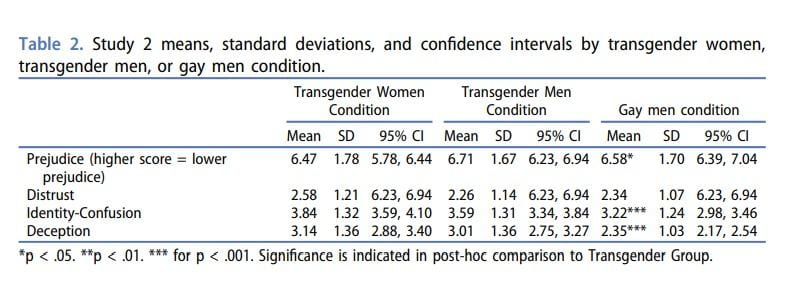
Photo courtesy of City of Toronto Twitter account (@cityoftoronto)
In order to give some background on my research this summer, I thought it made sense to discuss a paper written by my internship professor. In 2019, Rebecca Totton and Kimberly Rios published “,Predictors of anti-transgender attitudes: Identity-confusion and deception as aspects of distrust.” This paper discusses three studies on how distrust, identity-confusion, and perceived deception uniquely apply to trans individuals compared to other members of the LGBT community.
Prejudice operates on the idea that different groups represent different threats which evoke different reactions. Previous studies have shown that outgroups that are difficult to categorize are seen as a greater threat, such as atheists, bisexuals, and biracial people. Trans people are seen as a threat to social norms because they do not fit within the established order. Totton and Rios believed that distrust of the trans “outgroup” might stem from ideas of identity confusion or perceived deception.
Following this train of thought, the three hypotheses this paper addresses are that anti-trans prejudice is stronger than anti-gay or anti-lesbian prejudice; trans people are seen as less trustworthy than sexual minorities of the LGB community; and distrust of trans people is connected to identity confusion or deception.
An initial pilot study measured 82 students’ feelings of warmth toward different groups. Results revealed that participants felt less warmth towards trans people than gay men and lesbians. With this premise confirmed, researchers conducted more nuanced studies. Study 1 compared 136 students’ attitudes towards trans people versus those towards gay men. More specifically, participants were asked to evaluate if the two groups were confused about their respective identity, report general attitudes towards these groups, and rate the extent to which specific traits applied to these groups. As expected, participants felt more prejudice and greater distrust towards trans individuals than gay men and saw trans individuals as more confused about their identity. Trans people were seen as more deceptive than gay men, which led to participants regarding trans people with greater distrust.


Top graphic from Totton & Rios, 2019, page 6. Bottom graphic from page 8.
In contrast to Study 1 treating trans people as one group, Study 2 compared 366 students’ perceptions of trans women to those of trans men. The researchers hypothesized that trans women are the target of greater prejudice, distrust, perceived deception, and identity confusion than either trans men or gay men. The results largely confirmed these ideas: trans women received greater prejudice than gay men and slightly more than trans men; trans women provoked greater distrust than trans men; trans women were viewed as having greater identity confusion than gay men, but not more than trans men; trans women were seen as more deceptive than gay men, but not trans men; and trans women were seen as more actively deceptive and confused about their identity than gay men. As with Study 1, Study 2 found that deception was the deciding factor in predicting distrust and prejudice, rather than identity confusion.

Graphic from Totton & Rios, 2019, page 9.
To expand the scope of these investigations, Study 3 included lesbians and bisexuals as comparison groups. The hypothesis for this study was that trans people are treated with more prejudice and distrust than gay men or lesbian women while being seen as higher in identity confusion and deception. This study had 464 participants indicate their distrust toward the four groups (trans people, gay men, lesbian women, bisexual people) based off of adjective association scales, as well as measure participants’ motivation to control prejudice towards these groups and participants’ efforts toward social desirability. These were the results: trans people were treated with significantly more prejudice than gay men and slightly more than lesbian women, with no difference from bisexuals; trans people were distrusted more than gay men, slightly more than lesbian women, and no difference from bisexuals; trans people were seen as more deceptive than all three groups; and trans people were rated similarly to bisexuals on distrust and identity confusion, but still seen as more deceptive.

Graphic from Totton & Rios, 2019, page 14.
In summary, Totton and Rios found that people feel more negatively towards trans people than gay men, and these negative feelings are motivated by a perceived deception. This prejudice is stronger against trans women than trans men, and trans people are seen as more deceptive than lesbians or bisexuals. Therefore, the most important takeaway is that the LGBTQ community should not be regarded as a homogenous group, but rather a combination of distinct identities that face different prejudices and hurdles towards acceptance.
Reference: Rebecca Totton & Kimberly Rios (2019): Predictors of anti-transgender attitudes: Identity-confusion and deception as aspects of distrust, Self and Identity, DOI: 10.1080/15298868.2019.1621928
You must be logged in to post a comment.